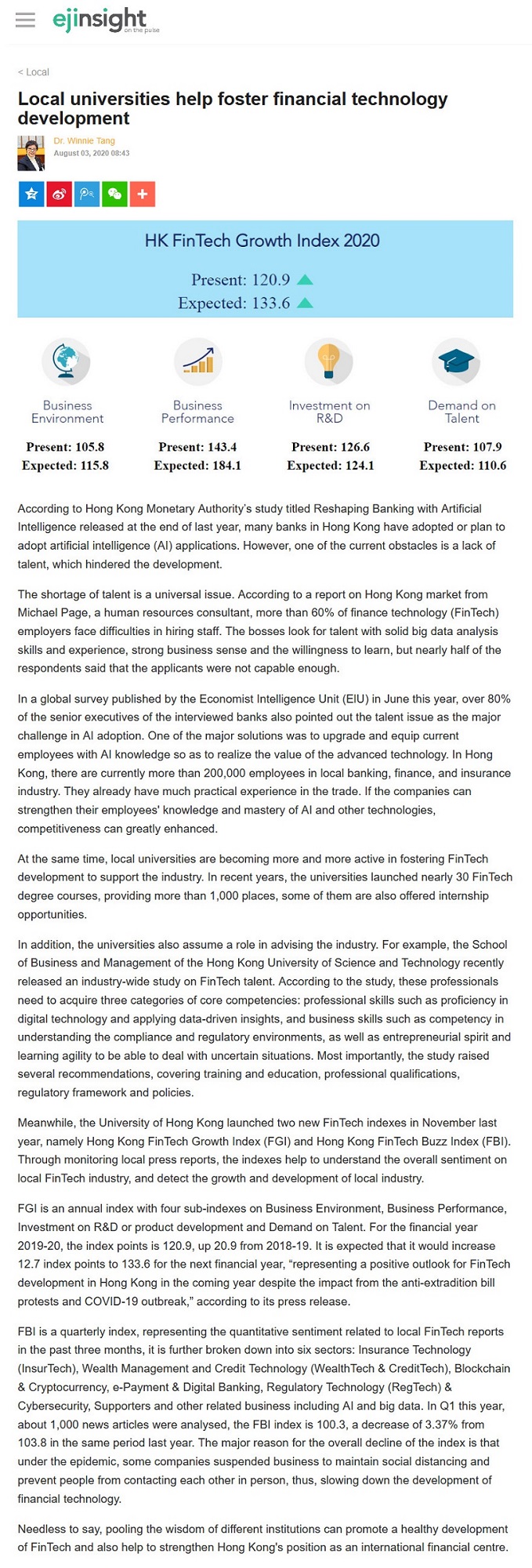網上版請按此

Local universities help foster financial technology development
According to Hong Kong Monetary Authority's study titled Reshaping Banking with Artificial Intelligence released at the end of last year, many banks in Hong Kong have adopted or plan to adopt artificial intelligence (AI) applications. However, one of the current obstacles is a lack of talent, which hindered the development.
The shortage of talent is a universal issue. According to a report on Hong Kong market from Michael Page, a human resources consultant, more than 60% of finance technology (FinTech) employers face difficulties in hiring staff. The bosses look for talent with solid big data analysis skills and experience, strong business sense and the willingness to learn, but nearly half of the respondents said that the applicants were not capable enough.
In a global survey published by the Economist Intelligence Unit (ElU) in June this year, over 80% of the senior executives of the interviewed banks also pointed out the talent issue as the major challenge in AI adoption. One of the major solutions was to upgrade and equip current employees with AI knowledge so as to realize the value of the advanced technology. In Hong Kong, there are currently more than 200,000 employees in local banking, finance, and insurance industry. They already have much practical experience in the trade. If the companies can strengthen their employees' knowledge and mastery of AI and other technologies, competitiveness can greatly enhanced.
At the same time, local universities are becoming more and more active in fostering FinTech development to support the industry. In recent years, the universities launched nearly 30 FinTech degree courses, providing more than 1,000 places, some of them are also offered internship opportunities.
In addition, the universities also assume a role in advising the industry. For example, the School of Business and Management of the Hong Kong University of Science and Technology recently released an industry-wide study on FinTech talent. According to the study, these professionals need to acquire three categories of core competencies: professional skills such as proficiency in digital technology and applying data-driven insights, and business skills such as competency in understanding the compliance and regulatory environments, as well as entrepreneurial spirit and learning agility to be able to deal with uncertain situations. Most importantly, the study raised several recommendations, covering training and education, professional qualifications, regulatory framework and policies.
Meanwhile, the University of Hong Kong launched two new FinTech indexes in November last year, namely Hong Kong FinTech Growth Index (FGI) and Hong Kong FinTech Buzz Index (FBI). Through monitoring local press reports, the indexes help to understand the overall sentiment on local FinTech industry, and detect the growth and development of local industry.
FGI is an annual index with four sub-indexes on Business Environment, Business Performance, Investment on R&D or product development and Demand on Talent. For the financial year 2019-20, the index points is 120.9, up 20.9 from 2018-19. It is expected that it would increase 12.7 index points to 133.6 for the next financial year, "representing a positive outlook for FinTech development in Hong Kong in the coming year despite the impact from the anti-extradition bill protests and COVID-19 outbreak," according to its press release.
FBI is a quarterly index, representing the quantitative sentiment related to local FinTech reports in the past three months, it is further broken down into six sectors: Insurance Technology (InsurTech), Wealth Management and Credit Technology (WealthTech & CreditTech), Blockchain & Cryptocurrency, e-Payment & Digital Banking, Regulatory Technology (RegTech) & Cybersecurity, Supporters and other related business including AI and big data. In Q1 this year, about 1,000 news articles were analysed, the FBI index is 100.3, a decrease of 3.37% from 103.8 in the same period last year. The major reason for the overall decline of the index is that under the epidemic, some companies suspended business to maintain social distancing and prevent people from contacting each other in person, thus, slowing down the development of financial technology.
Needless to say, pooling the wisdom of different institutions can promote a healthy development of FinTech and also help to strengthen Hong Kong's position as an international financial centre.
Dr. Winnie Tang
Adjunct Professor, Department of Computer Science, Faculty of Engineering; Department of Geography, Faculty of Social Sciences and Faculty of Architecture, The University of Hong Kong